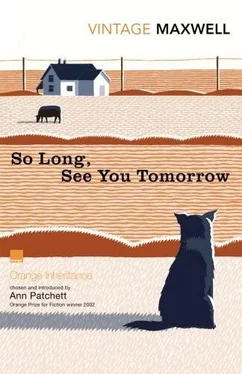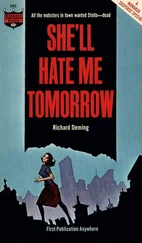The ringing of the locusts wore itself out and stopped, only to start up again in the treetops. With Aunt Jenny standing over him telling him what to do next, Cletus carried load after load of junk up the outside cellar stairs and on out to the alley. Cans of long-dried paint and varnish. Jars of preserve that had gone bad or were too old to be trusted. Empty medicine bottles. Bundles of old magazines and newspapers. An iron bedstead. A chair with a cane seat that had given way. A sheet-iron stove with one leg missing. A ten- gallon milk can with a hole in the bottom. Screens so eaten with rust that you could put your finger through them. Occasionally she would decide that something — a bamboo picture frame with its glass broken or a silk dress that was stained under the arms — was too good to throw away, and it was put aside until she could recollect somebody who would be glad to have it. Going through a box of old letters, she came upon a canceled bankbook and turned the pages thoughtfully. "I have a little money," she remarked. ( Why did she say that? It was the one thing she meant to tell nobody. . .) "Tom had a life insurance policy that was all paid up when he died. I may not be in the same class with John D. Rockefeller, but you'd find that five thousand dollars was a lot of money if you tried to save it. . It'll go to your mother when I die. I just wanted you to know how things are." Which wasn't exactly the truth; what she really wanted was for him to say something — to be surprised by this cat she had inadvertently let out of the bag. "I mean you won't starve," she said.
It took both of them to carry the horsehair mattress spotted with mildew. As they were coming back from the alley, she said, "That's enough for today. There's a storeroom that needs cleaning out but it can wait." He closed the cellar door, she gave him the padlock, which had been in her apron pocket, and they went into the house by way of the back porch. She wanted to say / don't like the way things have turned out any better than you do, and was afraid to say it lest Cletus think she wasn't glad to have them under her roof.
She made him wash his hands at the kitchen sink and gave him a glass of cold milk and a large piece of gooseberry pie.
Leaning against the sink, he took a swallow of milk and then said, "When Victor and Pa come in from the fields, who gets their meals?"
"Nobody, so far as I know. It isn't easy for them, I'm sure, but any man knows how to fry bacon and eggs and make coffee."
"They're used to eating more than that."
"He may have to get somebody to keep house for him, like Mr. Wilson," she said, and could have bit her tongue out.
"You'll have Sunday dinner with us, won't you?" his mother said. "Come right from church, so we can have a good visit."
There was no way Clarence could say no or he would have. He didn't tell her that he had stopped going to church.
When they sat down to the table, he saw that his mother had cooked all his favorite dishes, and he tried to eat, though he had no appetite. From his father's uneasiness and from the careful absence of any expression on her face, he knew that her feelings were hurt. She had expected him to tell them everything he couldn't tell the judge and the jury, and when he didn't she thought it was because he didn't trust them.
"We've been expecting the boys to pay us a visit," she said, "but so far they haven't. I dare say Fern won't allow it."
"I don't imagine she would do that," he said, avoiding her glance.
His mother and father were the only two people on earth he trusted at this point, but where to begin? With the fact that he was having trouble scraping together the money to pay his ex-wife's alimony? There wasn't anything he could tell them that wouldn't make them grieve, and anyway, he couldn't bear to talk about it.
He knew what had been done to him but not what he had done to deserve it.
It would have been a help if at some time some Baptist preacher, resting his forearms on the pulpit and hunching his shoulders, had said People neither get what they deserve nor deserve what they get. The gentle and the trusting are trampled on. The rich man usually forces his way through the eye of the needle, and there is little or no point in putting your faith in Divine Providence. . . On the other hand, how could any preacher, Baptist or otherwise, say this?
Fern was advised by her attorney that it would be better if she and Lloyd Wilson didn't see each other for a time. When they wrote to each other, they were careful to post the letters themselves. Her letters were very long, his short. It was not natural to him to put his feelings on paper. But as she read and reread his letters, the words that were not there were put there by her imagination, until she was satisfied that he really did love her as much as she loved him.
The dog waited every afternoon by the mailbox. She knew when it was time to round up the cows, but the boy might come and not find her there. So she went on waiting, and when she saw the man coming toward her she ran off into a cornfield, but only a little ways. She didn't really try to escape the beating she knew he was going to give her.
Cletus started to ride out to the farm on his bicycle and his mother said, "Where are you going?" and he told her and she said, "I'd rather you didn't." When he asked why not, she looked unhappy and said, "Please don't argue with me,
Cletus. If your father wants to see you, he'll say so."
It was only a hairline hesitation that kept her from telling him everything. Eventually, when he was grown, she would sit down with him some day and tell him the whole story from the beginning, and he would appreciate all she had been through, and forgive her. Your father wouldn't give me my freedom, she would say, and so I had to go to court and get it that way. … In these imaginary conversations it did not occur to her that he might not forgive her. If Lloyd hadn't been in love with me, she imagined herself saying. Or if he had loved his wife, I guess I would have gone on being married to your father, ill-suited to each other though we were…
At the memory of Lloyd Wilson's hands resting on her shoulders as he bent down and kissed her, she shuddered with happiness.
By staring at her fixedly, Wayne made the acquaintance of a little girl named Patsy, who lived four or five houses down the street from Aunt Jenny's house. She had a tricycle, which they rode up and down the cement sidewalk, and only now and then did they quarrel about whose turn it was. He went to Patsy's house early in the morning, and when lunchtime came and Patsy's mother asked him if he would like to stay and eat with them, he always said yes. When she said, "Don't you think it would be a good idea if you ran home and told your mother?" he said, "She won't mind."
Patsy's mother thought it would be nice if Wayne's mother said, "Thank you for being so nice to my little boy," or something of that kind, instead of not even bothering to look up when she was passing the house. And her name in the paper and all.
In a town the size of Lincoln there are no well-kept secrets. Somebody told somebody who told somebody who told somebody who told Clarence about the fat letters with no return address that Fern dropped in the big green box in front of the post office after dark. It didn't even take very long for this to happen. Or for Fern to find out that Clarence knew.
Only now, after the long battle had been won, did she become frightened. She found herself thinking, for the first time, about Clarence. About what she had done to him. And what he might be capable of. She hadn't wanted to take the fifty dollars a month alimony. It was the lawyer's idea. She found herself reliving the moment when Clarence picked up the poker and started for her. And other moments like it.
Читать дальше












